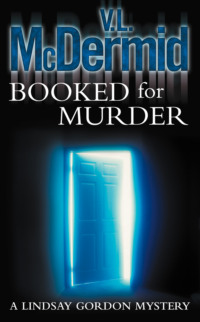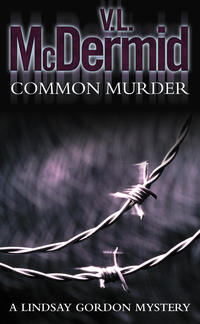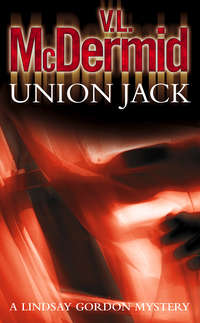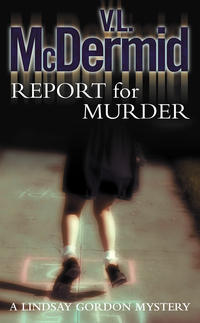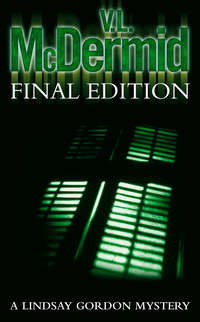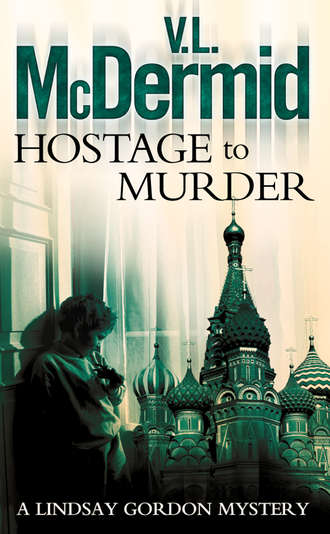
Полная версия
Hostage to Murder

V. L. McDERMID
Hostage to Murder


Copyright
This novel is entirely a work of fiction. The names, characters and incidents portrayed in it are the work of the author’s imagination. Any resemblance to actual persons, living or dead, events or localities is entirely coincidental.
HarperCollinsPublishers Ltd. 1 London Bridge Street London SE1 9GF
www.harpercollins.co.uk
Published by HarperCollinsPublishers 2003
Copyright © V.L. McDermid 2003
Val McDermid asserts the moral right to be identified as the author of this work
A catalogue record for this book is available from the British Library
All rights reserved under International and Pan-American Copyright Conventions. By payment of the required fees, you have been granted the non-exclusive, non-transferable right to access and read the text of this ebook on-screen. No part of this text may be reproduced, transmitted, down-loaded, decompiled, reverse engineered, or stored in or introduced into any information storage and retrieval system, in any form or by any means, whether electronic or mechanical, now known or hereinafter invented, without the express written permission of HarperCollins ebooks
HarperCollinsPublishers has made every reasonable effort to ensure that any picture content and written content in this ebook has been included or removed in accordance with the contractual and technological constraints in operation at the time of publication
Source ISBN: 9780007173495
Ebook Edition © NOVEMBER 2008 ISBN: 9780007301683
Version: 2017-07-25
In memory of Gina Weissand (1946–2001) who was everything a friend should be. You blessed us all, babe, and we miss you.
He that hath wife and children hath given hostages to fortune.
‘Of Marriage and the Single Life’
Francis Bacon
Contents
Title Page Copyright Dedication Part One Chapter One Chapter Two Chapter Three Chapter Four Chapter Five Chapter Six Chapter Seven Chapter Eight Chapter Nine Chapter Ten Chapter Eleven Part Two Chapter Twelve Chapter Thirteen Chapter Fourteen Chapter Fifteen Chapter Sixteen Chapter Seventeen Chapter Eighteen Chapter Nineteen Chapter Twenty Chapter Twenty One Chapter Twenty Two Chapter Twenty Three Chapter Twenty Four Chapter Twenty Five Chapter Twenty Six Epilogue Keep Reading Acknowledgements About the Author By the Same Author About the Publisher
PART ONE
1
A murder of crows swore at each other in the trees that lined the banks of the River Kelvin. A freezing drizzle from a low sky bleached the landscape to grey. Nothing, Lindsay thought, could be further from California. The only thing in common with the home she’d left three months before was the rhythm of her feet as she ran her daily two miles.
On mornings like this, Lindsay found it hard to remember that she’d once loved this city. When she’d come back to Scotland after university and journalism training, she’d thought Glasgow was paradise. She had money in her pocket, she was young, free and single and the city had just begun the process of reinvigoration that had, by the millennium, made it one of the most exciting cities in Britain. Now, fifteen years later, there was no denying it was a good place to live. The cultural life was vibrant. The restaurants were cosmopolitan and covered the whole range from cheap and cheerful to glamorous and gourmet. There were plenty of beautiful places to live, and more green spaces than most cities could boast. Some of the finest countryside in the world was within an hour’s drive.
And all she could think of was how much she wanted to be somewhere else. Seven happy and successful years in California had left her feeling that this long narrow land was no longer full of possibilities for her. Partly, it was the weather, she thought, wiping the cold mixture of sweat and rain from her face. Who wouldn’t long for sunshine and the Pacific surf on a morning like this?
Partly, it was that she missed her dog. Mutton had always accompanied her on her runs, his black tail wagging eagerly whenever she walked downstairs in her jogging clothes. But she couldn’t contemplate putting him in quarantine kennels for six months, so he’d been handed over to some friends in the Bay Area who’d guaranteed him a happy life. He’d probably forgotten her already.
But mostly it was not having anything meaningful to do with her days. Lindsay would never have described herself as someone who was defined by her job, but now that she had none, she had come to realize how much of her identity had been bound up in what she did for a living. Without some sort of employment, she felt cast adrift. When people asked, ‘And what do you do?’ she had no answer. There were few things she hated more than the sense of powerlessness that provoked in her.
In California, Lindsay had had a response, one she felt proud of, one she knew carried a degree of respect. She’d reluctantly abandoned her post lecturing in journalism at Santa Cruz to come back to Scotland because her lover Sophie had been offered the chair of obstetrics at Glasgow University. Lindsay had protested that she didn’t have anything to go back for, but Sophie had managed to convince her she was mistaken. ‘You’ll walk into a teaching job in Scotland,’ she’d said. ‘And if it takes a while, you can always go back to freelance journalism. You know you were one of the best.’
And so she had stifled her doubts for Sophie’s sake. After all, it wasn’t her lover’s fault that Lindsay had reached the age of thirty-nine without a clearly defined career plan. But now she was confronted by the cold reality of unemployment, she wished she’d done more to persuade Sophie to stay in California. She’d looked around for teaching work, but vocational journalism training wasn’t nearly as widespread in Scotland as it was in the US. She’d managed to secure some part-time lecturing at Strathclyde University, filling in for someone on maternity leave, but it was dead-end work with no prospects. And the idea of going back to the overcrowded world of freelance journalism with a contacts book that was years out of date held no appeal.
So her days had shrunk to this. Pounding the walkway by the river. Reading the papers. Shopping for dinner. Arranging to meet old acquaintances for drinks and discovering how much distance there was between them. Waiting for Sophie to come home and bring her despatches from the world of work. Lindsay knew she couldn’t go on like this indefinitely. It was poisoning her soul, and it wasn’t doing her relationship with Sophie much good either.
She reached the point where she had to turn off the walkway and head up the steep hill to the Botanic Gardens, the halfway point on her circuit. Head down, she powered up the slope, too wrapped up in her thoughts to pay heed to her surroundings. As she rounded a blind bend, she realized she was about to cannon into someone walking down the hill. She swerved, but simultaneously the other woman sidestepped in the same direction. They crashed into each other and Lindsay stumbled, smacking into a tree and falling to one knee, her ankle twisting under her. ‘Shit,’ she gasped.
‘Oh God, I’m sorry,’ the other woman said.
‘My own fault,’ Lindsay growled, pushing herself upright, then wincing as she tried to take her weight on the damaged ankle. ‘Jesus,’ she hissed, leaning forward to probe the joint with her fingers.
‘You’ve not broken it or anything?’ The woman frowned solicitously.
‘Sprained, I think.’ She drew in her breath sharply when she touched the tender heart of the injury.
‘Have you far to go? Only, I live just the other side of the river. My car’s there. I could drive you?’
It was a tempting offer. Lindsay didn’t fancy hiking a mile on a damaged ankle. She looked up, taking in her nemesis turned Good Samaritan. She saw a woman in her late twenties with an angular face and short blonde hair cut to fashionable effect. Her eyes were slate blue, her eyebrows a pair of dark circumflex accents above them. She was dressed out of Gap and carried a leather knapsack over one shoulder. She didn’t look like an axe murderer. ‘OK,’ Lindsay said. ‘Thanks.’
The response wasn’t what she expected. Instead of the offer of an arm to help her down the hill and across the bridge, the woman looked taken aback, her eyes widening and her lips parting. ‘You’re Lindsay Gordon,’ she said, bemused.
‘Do I know you?’ Lindsay leaned against the tree, wondering if she’d taken a blow to the head she hadn’t registered at the time.
The blonde grinned. ‘We met about ten years ago. You came to the university GaySoc to talk about gays and the media. A bunch of us went out for a drink afterwards.’
Lindsay strained at the locked gates of memory. ‘Edinburgh University?’ she hazarded.
‘That’s right. You remember?’
‘I remember doing the talk.’
The blonde gave a rueful pout. ‘But you don’t remember me. Well, that’s hardly surprising. I was just a gawky wee fresher who was too overawed to open her mouth. But, hey, this is terrible. Me standing here reminiscing while you’re suffering like this.’ Now she extended her arm. ‘Lean on me. I’m Rory, by the way. Rory McLaren.’
Lindsay took the proffered arm and began to limp gingerly down the slope. ‘I’m amazed you recognized me all these years later,’ she said. The least she could do was make conversation, even though she felt more like swearing with every step.
Rory chuckled. ‘Oh, you were pretty impressive. You’re part of the reason I ended up doing what I do.’
‘Which is?’
‘I’m a journo.’
‘Oh well, never mind,’ Lindsay said, attempting a levity she didn’t feel. The last thing she needed right now was some bright and bouncy kid still jam-packed with idealism making her feel even more old and decrepit than she already did.
‘No, I love it,’ Rory assured her.
‘How do you manage that?’ They had reached the bottom of the hill and were making their way across the bridge. Moving on the flat was easier, but Lindsay was glad she’d taken up Rory’s offer, even if the conversation was depressing her.
‘It’s a long story.’
Lindsay looked up at the climb that would take them back to street level. ‘It’s a big hill.’
‘Right enough,’ Rory said. ‘Well, I started off on the local paper in Paisley, which wasn’t exactly a barrel of laughs, but at least they trained me. I got a couple of lucky breaks with big stories that I sold on to the nationals, and I ended up with a staff job on the Standard.’
Lindsay snorted. ‘Working on the Standard makes you happy? God, things must have changed since my day.’
‘No, no, I’m not there any more.’
‘So where are you now?’ Even in her state of discomfort, Lindsay noticed that Rory seemed faintly embarrassed.
‘Well, see, that’s the long-story bit.’
‘Take my mind off the pain and cut to the chase.’
‘I came up on the lottery.’
‘Jammy,’ Lindsay said.
‘Aye. But not totally jammy. I didn’t get the whole six numbers, just the five plus the bonus ball. But that was enough. I figured that if I invested the lot, it would earn enough in interest to keep a roof over my head. So I jacked the job in and now I’m freelance.’
‘And that’s your idea of fun? Out there in the dog-eat-dog world?’ Lindsay tried not to sound as sceptical as she felt. She’d been a freelance herself and knew only too well how tough it was to stay ahead of the pack.
‘I figured what I needed was an angle. And I remembered something you said back at that talk at the GaySoc.’
‘This is surreal,’ Lindsay said. The word felt entirely inadequate to encompass the situation.
‘I know. Wild, isn’t it? I can’t believe this is really you.’
‘Me neither. So what did I say that was so significant it came back to you all those years later?’
‘You were talking about the ghetto mentality. How people think gays are completely different, completely separate from them. But we’re not. We’ve got more in common with the straight universe than we have dividing us. And I thought, gays and lesbians don’t just have gay and lesbian lives. They’ve got jobs. They’ve got families. They’ve got stories to tell. But most folk in our world have no reason to trust journalists. So I thought, what if I set myself up as the journalist that the gay community can trust? What a great way to get stories to come to me.’ Rory’s voice was passionate now, her excitement obvious.
‘And that’s what you did?’
‘Right. I’ve been at it over a year now, and I’ve had some fabulous exclusives. I mostly do investigative stuff, but I’ll turn my hand to anything. And I’m making a good living.’
They were almost out of the woods and on to the street. But although she desperately wanted to get the weight off her ankle, Lindsay didn’t want this conversation to end. For the first time since she’d got back from California, she was hearing someone talk about her field with something other than apathy or cynicism. ‘So how did you get started?’
Rory pulled open the gate that led out from the riverbank on to the quiet backwater of Botanic Crescent. ‘That’s my flat, on the corner there. I could fill you in over a coffee.’
‘Are you sure I’m not keeping you from anything?’
‘God, no. Have you any idea how amazing it is for me to be talking to you? It’d have to be a bloody good story to make me miss a chance like this.’
They crossed the road. Rory keyed a number into the security door of a red sandstone tenement and ushered Lindsay into a spotless tiled close. They made their way up one flight of worn stone stairs, then Rory unlocked the tall double doors that led into her first-floor flat. ‘Excuse the mess,’ she said, leading the way into the big dining kitchen at the back of the flat.
There was no false modesty behind Rory’s words. It was, as she had said, a mess. A cat sprawled on a kitchen worktop by the window, while another lay curled on one of several piles of newspapers and magazines stacked on the floor. The tinfoil containers from the previous night’s curry sat on another worktop alongside three empty bottles of Becks, while the sink was piled with dirty plates and mugs. Lindsay grinned. ‘Live alone, do you?’
‘That obvious, is it?’ Rory picked a dressing gown off one of the chairs. ‘Grab a seat. Do you want some ice for that ankle? I’ve got a gel pack in the freezer.’
‘That’d be good.’ Lindsay lowered herself into the chair. In front of her was that morning’s Herald, the cryptic crossword already completed with only a couple of jottings in the margin.
Rory rummaged in a freezer that looked like the Arctic winter, but emerged triumphant with a virulent turquoise oblong. ‘There we go.’ She handed it to Lindsay and crossed to the kettle. ‘Coffee, right?’
‘Is it instant?’
Rory turned, her eyebrows raised in a teasing question. ‘What if it is?’
‘I’ll have tea.’
‘I was only bothering you. It’s proper coffee. I get it from an Italian café in town.’
She busied herself with beans and grinder. When the noise subsided, Lindsay said, ‘You were going to tell me how you got started.’
‘So I was.’ Rory poured the just-boiled water on the grounds she’d spooned into a cafetiere. ‘I decided I needed to be visible. So I had a word with the guy who owns Café Virginia. You know Café Virginia? In the Merchant City, down by the Italian Quarter?’
Lindsay nodded. It hadn’t been a gay venue when she’d lived in the city. It had been a bad pub that sold worse food, called something stupidly suggestive like Pussy Galore. But she was aware that it had been reincarnated as the city’s premiere gay and lesbian café bar, although she hadn’t paid it a visit yet. Sophie hadn’t had much time for hitting the nightlife; she’d been too busy getting her feet under the operating table. Most of the socializing they’d done had been at dinner parties or in restaurants. Another sign of ageing, Lindsay had already decided. ‘I know where you mean,’ she said.
‘I told him my idea, and we did a deal. Three-month trial basis. He’d let me use one of the booths in the back bar as a kind of office. And I’d do bits and pieces of PR for him. So I wander down there most mornings and set up shop in the bar. Pick up the papers on the way, take my laptop and my mobile and get to work.’
‘And people actually bring you stories?’
Rory poured out the coffee and brought two mugs across to the table. She sat down opposite Lindsay and met her questioning gaze. ‘Amazingly enough, they do. It was a bit slow to start with. Just the odd gossipy wee bit that made a few pars in the tabloids. But then one of the lunchtime regulars who works in the City Chambers dropped me a juicy tale about some very dodgy dealing in the leisure department. I got a splash and spread in the Herald, and I was away. People soon realized I could be trusted to protect my sources, so everybody with an axe to grind came leaping out of the woodwork. Absolute bonanza.’ She grinned. It was hard not to be seduced by her delight.
‘I’m impressed,’ Lindsay said. ‘And it’s not a bad cup of coffee, either.’
‘So what are you doing back in Glasgow? Last I heard about you was when you got involved in Union Jack’s murder at the Journalists’ Union conference. The word was that you were living in California, that you’d given up the game for teaching. How come you’re back in Glasgow?’
Lindsay stared into her coffee. ‘Good question.’
‘Has it got an answer?’ There was a long silence, then Rory continued. ‘Sorry, I can’t help myself. I’m a nosy wee shite.’
‘It’s a good quality in a journalist.’
‘Aye, but it’s not exactly an asset in the social skills department,’ Rory said ruefully. ‘Which would maybe be why, as you rightly pointed out, I live alone.’
‘I came back for love,’ Lindsay said. The kid had worked hard for an answer. It seemed a reasonable exchange for a decent cup of coffee and some pain relief.
Rory ran a hand through her hair. ‘God, what a dyke answer. Why do we ever do anything demented? Love.’
‘You think it’s demented to come back to Glasgow?’
Rory pulled a rueful face. ‘Me and my big mouth. I mean, for all I know, California’s not what it’s cracked up to be. So, what are you doing with yourself now?’
Lindsay shook her head. ‘Not a lot. Mostly waiting for the love object to come home from the high-powered world of obstetrics and gynaecology.’
‘You don’t fancy getting back into deadline city, then?’
Lindsay leaned back in her seat, trying to ease her T-shirt away from her shoulder blades now that the sweat had dried and stuck it to her skin. ‘I’ve no contacts. I’ve not written a news story in seven years. I don’t even know the name of my local MSP, never mind who’s running Celtic and Rangers. It’d be like starting all over again as a trainee reporter on the local weekly.’
Rory gave her a speculative look. ‘Not necessarily,’ she said slowly.
‘Meaning what?’ Lindsay couldn’t even be bothered to be intrigued.
‘Meaning, you could always come and work with me.’
2
Morning rain on the Falls Road, grey sky only half a shade lighter than gunmetal; a comparison that still came too easy to too many people in Belfast. Ceasefires, peace deals, referendums and still it caught people by surprise that the disasters on the news were happening some other place.
A black taxi pulled up outside a betting shop on a street corner. These days, sometimes a black taxi was just a taxi. This one wasn’t. This one was bringing Patrick Coughlan to work. To his official work. When he went about his unofficial work, the last thing he wanted to be seen in was IRA trademark wheels. In the days when he went about his unofficial work rather more frequently than of late, he had always gone under his own steam, in any one of a dozen nondescript vehicles. Of course the security services had almost certainly known Patrick Coughlan was a senior member of the IRA Army Council, but they’d never been able to catch him at it. He was a careful as well as a solid citizen.
The cab idled for a full minute by the kerb while Patrick scrutinized the street. If someone had asked what he was looking for, he’d have been hard pressed to answer. He only knew when it wasn’t there. Satisfied, he stepped out of the cab and across the pavement. A man in his early fifties, obviously once very handsome, his features now blurred with slightly too much weight and high living, his walk betrayed a sense of purpose. His hair was a glossy chestnut, suspiciously so at the temples for a man who had lived his particular life. In spite of the laughter lines that surrounded them, his eyes were dark, shrewd and never still.
He pulled open the door on a gust of stale air and stepped inside. To the uninformed eye, just a busy Belfast betting shop, nothing to differentiate it from any other. Odds were chalked up on whiteboards, sporting papers pinned to the walls, tiled floor pocked with cigarette burns. The clientele looked like the unemployed, the unemployable and the retired. Every one of them was male. The staff were working hard behind metal grilles, but not so hard that they didn’t all glance up at the opening of the door. The smoke of the day’s cigarettes already hung heavy in the air, even though it was barely eleven.
Patrick crossed the room like the lord of the manor, nodding affably, waving a proprietary greeting to several regulars. They returned the greeting deferentially, one actually tugging the greasy brim of a tweed cap. It had never struck anyone as odd that so avowed a Republican should behave quite so much like an English patrician.
Patrick continued across the room towards a door set in the wall by the end of the counter. One of the staff automatically slid a hand beneath the counter and the sound of a buzzer followed. Without breaking stride, Patrick pushed through the door and into a dim corridor with stairs at the far end.
A door in the wall opened and a young woman with hair like a black version of Ronald McDonald and skin the blue white of skimmed milk stuck her head round it. ‘Sammy McGuire was on earlier. He said would you give him a call.’
‘I will, Theresa.’ Patrick continued down the corridor and up the stairs.
It would be hard to imagine how the office he walked into could have been more different from the seediness downstairs. The floor was parquet – the real thing, not those pre-glued packs from the DIY superstore – with a silver grey Bokhara occupying what space wasn’t taken up by a Regency desk that looked almost too much for its slender legs. The chair behind it was padded leather, the filing cabinets that lined the wall old mahogany buffed to a soft sheen. Two paintings on the wall, both copies, one of a Degas and one of a Stubbs, both featuring horses. The only thing that let the room down was the view of the Falls Road.
He’d thought of having the window bricked up and replacing it with another Degas. But it didn’t do to let people think you weren’t keeping an eye on them. Information had always been a commodity in Belfast; and if you didn’t yet have the information, it was almost as important to make it look as if there was no reason why you shouldn’t. So the window stayed.
Patrick lowered himself gingerly into the chair, a martyr to his back as well as his country. Settled, he reached for the phone and pushed a single button on the speed dialler.


